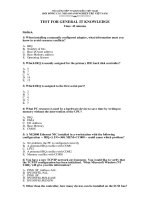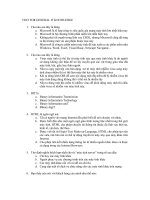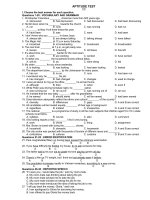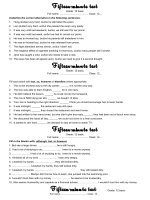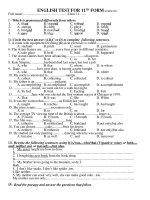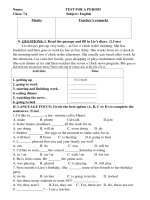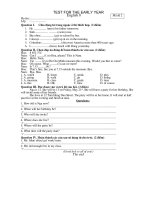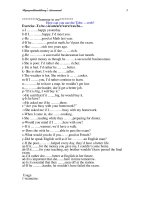test for ele
Bạn đang xem bản rút gọn của tài liệu. Xem và tải ngay bản đầy đủ của tài liệu tại đây (224.28 KB, 19 trang )
<span class='text_page_counter'>(1)</span><div class='page_container' data-page=1>
<b>Bộ Công thơng</b>
<b>Trờng ĐH Công nghiệp Hà Nội</b>
<b>Cộng hoà xà hội chủ nghĩa Việt Nam</b>
<b>Độc lập - Tù do - H¹nh phóc</b>
<b>đề thi</b>
<b> </b>
M«n thi: <b>TiÕng Anh </b> Hình thức: <b>Trắc nghiêm - T lun</b>
Thời gian : <b>60 phót</b> Líp-Kho¸ :
<b>Mã đè: 2A</b>
<b>PART I: VOCABULARY & GRAMMAR: (20P)</b>
<i>Identify the letter of the choice that best completes the statement or answers the question.</i>
1. _____ your family name?
a. What's b. Can I c. Who's d. May I
2. 'Family name' has the same meaning as _____ .
a. first name b. middle name c. nickname d. last name
3. Another way to say 'very smart' is _____ smart.
a. little b. pretty c. nice d. fast
4. _____ has the same meaning as 'difficult'.
a. hard b. smart c. serious d. dull
5. Young-hee doesn't have any brothers or sisters. She's _____ child.
a. one b. the only c. an alone d. an only
6. Your mother's sons are your _____ .
a. brothers b. cousins c. sisters d. daughters
7. Kevin works _____ JT Associates.
a. in b. for c. on d. from
8. What _____ of company is Daviserv?
a. exact b. work c. type d. long
9. I'd rather _______at home than ________out.
a. stay/ going b. staying/ go c. staying/ going d. stay/ go
10. I look forward to_____to Britain next month.
a. <sub>go </sub> b. <sub>to going </sub> c. <sub>to go </sub> d. <sub>going </sub>
11. I got _____ from Australia yesterday.
a. to b. again c. back d. return
12. The weather was very hot _____ the beach.
a. in b. to c. at d. from
13. I'm thirsty. I think I'll buy a _____ of water.
a. <sub>jar</sub> b. <sub>pack</sub> c. <sub>roll</sub> d. <sub>bottle</sub>
14. $1.29 is the same as ____.
a. one dollar ninety-two c. a dollar twenty-nine
b. one dollar two nine d. a dollar and twenty and nine
15. My history book ____ a red cover.
a. is b. has c. does d. have
16. _____ do you work?
</div>
<span class='text_page_counter'>(2)</span><div class='page_container' data-page=2>
17. My ……… always comes early so I get my letter before I go to work.
a. postman b. chemist c. butcher d. porter
18. The bus company has ……… the fare by 20 %.
a. raised b. risen c. raising d. arisen
19. ________football is exciting.
a. To playing b. Playing c. Plays d. Play
20. “_______ do you go out in the evenings?” “ Once or twice a week.”
a. How long b. When c. How often d. What
<b>PART II: MISTAKE CORRECTION (5P)</b>
<i><b>Identify mistakes in the following sentences by choosing A, B, C or D</b></i>
21. I'm looking for something little bit cheaper.
a. I'm b. looking c. for d. little bit
22. How many are you willing to spend?
a. How b. many c. are you d. to spend
23. What exactly you are looking for?
a. What b. exactly c. you are d. for
24. I don't know how to say you this.
a. <sub>don't know</sub> b. <sub>how to</sub> c. <sub>say</sub> d. <sub>this</sub>
25. Please let's me buy you another one.
a. let's b. me c. buy d. you
<b>PART III: READING (10P)</b>
<i>Read the following passages and answer the questions, circling a, b, c or d</i>
<b>Passage 1</b>
In 1939 only 15% of the school-age population attended school, while 80% of the total
population was illiterate. In 1945, President Ho Chi Minh promised to provide all Vietnamese with
the chance to read and write. He wanted to eradicate illiteracy. The campaign was a huge success
and over 10 million people became literate between 1946 and 1954. From 1954 to 1975, illiteracy
was eradicated in the 12-50 age group in most northern provinces. The third campaign came into
effect in the south and from 1975 onwards 1.5 million people learned to read and write.
The area where illiteracy rate remains highest are often remote mountainous regions. Here,
there are few people, communication is often difficult, there is lack of transportation, and there are
fewer opportunities for economic development than in urban areas.
In 1990, the Vietnamese Government established a 10-year illiteracy eradication program.
This campaign is aimed at ethnic minorities, the handicapped, children in remote areas and girls.
<b>26.</b> Why do remote mountainous regions often remain the highest illiteracy rate?
a. Because there are fewer opportunities for economic development than in urban
areas.
b. <sub>Because there is a lack of transportation.</sub>
c. All of A, B, D are correct.
d. Because communication is often difficult.
<b>27.</b> How was the campaign between 1946 and 1954?
</div>
<span class='text_page_counter'>(3)</span><div class='page_container' data-page=3>
<b>28.</b> Which of the followings is TRUE?
a. In 1990, a 10-year illiteracy eradication program was established by the
Vietnamese Government.
b. <sub>From 1954 to 1975, illiteracy was eradicated in the 12- 50 age group in most </sub>
southern provinces.
c. In 1939, 80% of the population in Vietnam was literate.
d. President Ho Chi Minh promised to provide all Vietnamese with the chance to read
and write in 1946.
<b>29.</b> What is the main idea of the passage?
a. President Ho Chi Minh and illiteracy eradication.
b. Literacy rate in Vietnam.
c. <sub>The struggle against illiteracy in Vietnam.</sub>
d. Illiteracy in Vietnam.
<b>30.</b> The subjects of the campaign in 1990 are ...
a. ethnic minorities, the handicapped, children in remote areas and girls
b. children in remote areas and girls
c. ethnic minorities
d. the handicapped
<b>Passage 2</b>
<b>A DAY OUT</b>
For the last few months I have spent every Saturday in my flat and have done nothing more exciting than
work at home, read the newspapers and watch television. I had begun feeling bored with this and so, last
weekend I thought I would do something different. I rang up several of my friends and we decided to go to
London for the day. I was really excited as I hadn’t been to London since I was ten. We decided to go by
coach as this was by far the cheapest means of transport that was available even though it meant that we
needed to get up very early.
Once in London we decided to take a sightseeing tour as we wanted to see some of the famous buildings.
After the tour we bought some sandwiches and ate them in a small park. In the afternoon two of us went
shopping and the others went to the theatre. We met up again at 6:30 p.m. and went to a small restaurant in
Soho. The meal was really good but, unfortunately, it took much longer than we had expected. We had to get
a taxi back to the coach station. Luckily, we got there just two minutes before our coach left.
<b>31.</b> The writer went to London ………
a. last month c. with some of his friends
b. for a few days d. to visit his friends
<b>32.</b> He felt so excited about going to London ………..
a. because he hadn’t been there before
b. because he went there ten years ago
c. because he hadn’t been there for a long time
d. because he hadn’t been there for ten years
<b>33.</b> Why did they decide to go by coach?
a. because they needed to get up very early .
b. because other means of transport were more expensive.
c. because it was among the cheapest means of transport.
d. because it is available
<b>34.</b> Which of the following is true?
a. They made a sightseeing tour of London and then had lunch.
b. They left the city at 6:30 p.m.
c. They all went shopping before going to the theatre.
d. They had lunch in a small restaurant.
</div>
<span class='text_page_counter'>(4)</span><div class='page_container' data-page=4>
a. they nearly missed the coach because of the meal.
b. they didn’t enjoy the meal in the restaurant very much.
c. the coach had left when they got to the station.
d. they nearly missed the coach because of the meal.
<b>PART IV: SENTENCE BUILDING (5P)</b>
<b>Choose the most well-formed sentence (A, B, C, or D) from the prompts given.</b>
<b>36.</b> We/ have/ lunch/ when/ hear/ news.
a. <sub>We had lunch when we heard the news.</sub>
b. We were having lunch when we were hearing the news.
c. We were having lunch when we heard the news.
d. We had lunch when we were hearing the news.
<b>37.</b> Talk/ foreigners/ make/ you/ interested/ learning/ language/ more.
a. Talk to foreigners makes you interested in learning the language more.
b. Talking to foreigners makes you interested in learning the language more.
c. <sub>Talking to foreigners makes you to be interested in learning the language more.</sub>
d. Talking to foreigners make you interested in learning the language more.
<b>38.</b> Reading books/ a cheap way/ get information/ entertain.
a. Reading books is a cheap way getting information and entertain.
b. Reading books is a cheap way to get information and entertain.
c. Reading books is a cheap way get information and entertain.
d. Reading books are a cheap way getting information and entertain.
<b>39.</b> I/ hear/ some body/ sing/next room/ now.
a. <sub>I can hear somebody to sing in the next room now.</sub>
b. I can hear somebody sing in the next room now.
c. I hearing somebody sing in the next room now.
d. I can hear somebody singing in the next room now.
<b>40.</b> His parents/ congratulate/ him/ pass/ entrance exam.
a. His parents congratulated him on passing the entrance exam.
b. His parents congratulated him to pass the entrance exam.
c. His parents congratulated him for passing the entrance exam.
d. His parents congratulated him on pass the entrance exam.
<b>PART V: WRITING (10P)</b>
<i>Write a passage of about 120 words to talk about your last weekend.</i>
<i> Ngµy ……… tháng 3 năm 2010</i>
<b>Trởng bộ môn</b>
<i>(Ký tên và ghi rõ họ và tên)</i>
<i><b>Trn Ngc c</b></i>
<b>Giỏo viờn son </b>
<i>(Ký tờn v ghi rừ h v tờn)</i>
</div>
<span class='text_page_counter'>(5)</span><div class='page_container' data-page=5>
<b>Bộ Công thơng</b>
<b>Trờng ĐH Công nghiệp Hà Nội</b>
<b>Cộng hoà xà hội chủ nghĩa Việt Nam</b>
<b>Độc lập - Tự do - Hạnh phúc</b>
<b> thi</b>
<b> </b>
M«n thi: <b>TiÕng Anh </b> Hình thức: <b>Trắc nghiêm - Tự luận</b>
Thêi gian : <b>60 phót</b> Líp-Kho¸ :
<b>Mã đè: 2B</b>
<b>PART I: SENTENCE BUILDING (5P)</b>
<b>Choose the most well-formed sentence (A, B, C, or D) from the prompts given.</b>
<b>1.</b> His parents/ congratulate/ him/ pass/ entrance exam.
a. His parents congratulated him on passing the entrance exam.
b. His parents congratulated him for passing the entrance exam.
c. His parents congratulated him to pass the entrance exam.
d. His parents congratulated him on pass the entrance exam.
<b>2.</b> We/ have/ lunch/ when/ hear/ news.
a. <sub>We had lunch when we were hearing the news.</sub>
b. We were having lunch when we were hearing the news.
c. We had lunch when we heard the news.
d. We were having lunch when we heard the news.
<b>3.</b> Talk/ foreigners/ make/ you/ interested/ learning/ language/ more.
a. Talk to foreigners makes you interested in learning the language more.
b. Talking to foreigners makes you interested in learning the language more.
c. Talking to foreigners makes you to be interested in learning the language more.
d. Talking to foreigners make you interested in learning the language more.
<b>4.</b> Reading books/ a cheap way/ get information/ entertain.
a. Reading books is a cheap way to get information and entertain.
b. Reading books is a cheap way getting information and entertain.
c. Reading books is a cheap way get information and entertain.
d. Reading books are a cheap way getting information and entertain.
<b>5.</b> I/ hear/ some body/ sing/next room/ now.
a. I can hear somebody sing in the next room now.
b. I can hear somebody to sing in the next room now.
c. I hearing somebody sing in the next room now.
d. I can hear somebody singing in the next room now.
<b>PART II: VOCABULARY & GRAMMAR: (20P)</b>
<i><b>Identify the letter of the choice that best completes the statement or answers the question.</b></i>
6. I'd rather _______at home than ________out.
a. stay/ going b. staying/ go c. stay/ go d. staying/ going
7. Kevin works _____ JT Associates.
a. in b. on c. From d. for
8. I look forward to_____to Britain next month.
</div>
<span class='text_page_counter'>(6)</span><div class='page_container' data-page=6>
a. return b. back c. Again d. to
10. What _____ of company is Daviserv?
a. type b. long c. Exact d. work
11. “_______ do you go out in the evenings?” “ Once or twice a week.”
a. <sub>What</sub> b. <sub> How long </sub> c. <sub>How often </sub> d. <sub>When </sub>
12. I'm thirsty. I think I'll buy a _____ of water.
a. roll b. pack c. Jar d. bottle
13. _____ do you work?
a. Which b. Where c. What d. Who
14. The bus company has ……… the fare by 20 %.
a. raised b. risen c. Arisen d. raising
15. My ……… always comes early so I get my letter before I go to work.
a. chemist b. butcher c. Porter d. postman
16. Your mother's sons are your _____ .
a. brothers b. cousins c. Sisters d. daughters
17. $1.29 is the same as ____.
a. one dollar ninety-two c. a dollar twenty-nine
b. one dollar two nine d. a dollar and twenty and nine
18. _____ your family name?
a. Can I b. What's c. Who's d. May I
19. Young-hee doesn't have any brothers or sisters. She's _____ child.
a. an alone b. the only c. one d. an only
20. Another way to say 'very smart' is _____ smart.
a. little b. nice c. Pretty d. fast
21. ________football is exciting.
a. To playing b. Play c. Playing d. Plays
22. My history book ____ a red cover.
a. does b. has c. Have d. is
23. _____ has the same meaning as 'difficult'.
a. dull b. smart c. hard d. serious
24. 'Family name' has the same meaning as _____ .
a. first name b. nickname c. middle name d. last name
25. The weather was very hot _____ the beach.
a. at b. to c. <sub>In</sub> d. from
<b>PART III: MISTAKE CORRECTION (5P)</b>
<i><b>Identify mistakes in the following sentences by choosing A, B, C or D</b></i>
26. I'm looking for something little bit cheaper.
a. little bit b. for c. Looking d. I'm
27. How many are you willing to spend?
a. How b. many c. to spend d. are you
28. What exactly you are looking for?
a. What b. exactly c. For d. you are
29. Please let's me buy you another one.
</div>
<span class='text_page_counter'>(7)</span><div class='page_container' data-page=7>
30. I don't know how to say you this.
a. this b. don't know c. how to d. say
<b>PART II: READING (10P)</b>
<i>Read the following passages and answer the questions, circling a, b, c or d</i>
<b>Passage 1</b>
<b>A DAY OUT</b>
For the last few months I have spent every Saturday in my flat and have done nothing more exciting than
work at home, read the newspapers and watch television. I had begun feeling bored with this and so, last
weekend I thought I would do something different. I rang up several of my friends and we decided to go to
London for the day. I was really excited as I hadn’t been to London since I was ten. We decided to go by
coach as this was by far the cheapest means of transport that was available even though it meant that we
needed to get up very early. Once in London we decided to take a sightseeing tour as we wanted to see some
of the famous buildings. After the tour we bought some sandwiches and ate them in a small park. In the
afternoon two of us went shopping and the others went to the theatre. We met up again at 6:30 p.m. and went
to a small restaurant in Soho. The meal was really good but, unfortunately, it took much longer than we had
expected. We had to get a taxi back to the coach station. Luckily, we got there just two minutes before our
coach left.
<b>31.</b> Why did they decide to go by coach?
a. because it is available
b. because it was among the cheapest means of transport.
c. because they needed to get up very early .
d. because other means of transport were more expensive.
<b>32.</b> The writer went to London ………
a. for a few days c. to visit his friends
b. with some of his friends d. last month
<b>33.</b> It can be inferred from the text that………
a. they nearly missed the coach because of the meal.
b. they didn’t enjoy the meal in the restaurant very much.
c. the coach had left when they got to the station.
d. they nearly missed the coach because of the meal.
<b>34.</b> He felt so excited about going to London ………..
a. because he went there ten years ago
b. because he hadn’t been there before
c. because he hadn’t been there for a long time
d. because he hadn’t been there for ten years
<b>35.</b> Which of the following is true?
a. They had lunch in a small restaurant.
b. They made a sightseeing tour of London and then had lunch.
c. They all went shopping before going to the theatre.
d. They left the city at 6:30 p.m.
<b>Passage 2</b>
</div>
<span class='text_page_counter'>(8)</span><div class='page_container' data-page=8>
The area where illiteracy rate remains highest are often remote mountainous regions. Here,
there are few people, communication is often difficult, there is lack of transportation, and there are
fewer opportunities for economic development than in urban areas.
In 1990, the Vietnamese Government established a 10-year illiteracy eradication program.
This campaign is aimed at ethnic minorities, the handicapped, children in remote areas and girls.
<b>36.</b> What is the main idea of the passage?
a. <sub>Literacy rate in Vietnam.</sub>
b. President Ho Chi Minh and illiteracy eradication.
c. Illiteracy in Vietnam.
d. The struggle against illiteracy in Vietnam.
<b>37.</b> The subjects of the campaign in 1990 are ...
a. children in remote areas and girls
b. the handicapped
c. <sub>ethnic minorities </sub>
d. ethnic minorities, the handicapped, children in remote areas and girls
<b>38.</b> Which of the followings is TRUE?
a. From 1954 to 1975, illiteracy was eradicated in the 12- 50 age group in most
southern provinces.
b. In 1939, 80% of the population in Vietnam was literate.
c. In 1990, a 10-year illiteracy eradication program was established by the
Vietnamese Government.
d. President Ho Chi Minh promised to provide all Vietnamese with the chance to read
and write in 1946.
<b>39.</b> How was the campaign between 1946 and 1954?
a. It was unsuccessful. c. It was huge.
b. <sub>It wasn't very successful.</sub> d. <sub> It was very successful.</sub>
<b>40.</b> Why do remote mountainous regions often remain the highest illiteracy rate?
a. Because there is a lack of transportation.
b. Because there are fewer opportunities for economic development than in urban
areas.
c. All of A, B, D are correct.
d. Because communication is often difficult.
<b>PART V: WRITING (10P)</b>
<i>Write a passage of about 120 words to talk about your last weekend.</i>
<i> Ngày tháng 3 năm 2010</i>
<b>Trởng bộ môn</b>
<i>(Ký tên và ghi rõ họ và tên)</i>
<i><b>Trn Ngc c</b></i>
<b>Giỏo viờn son </b>
<i>(Ký tờn v ghi rừ h v tờn)</i>
</div>
<span class='text_page_counter'>(9)</span><div class='page_container' data-page=9>
Trờng Đh Công Nghiệp Hà nôi <b>Bài thi kết thúc học phần</b>
<b> Khoa ngoại ngữ</b> <b><sub>môn: tiếng anh khễng chuyên</sub></b>
Họ và tên SV:
MÃ SV:
Ngày thi:
Lớp tiếng Anh:..
CB coi thi số 1: <i>(Họ và tên, ký)</i> Số phách
<i>(Do HĐ chấm thi ghi)</i>
CB coi thi số 2: <i>(Họ và tên, ký)</i>
<b>Bài thi kết thúc học phần</b>
<b>Môn: tiếng anh khễng chuyên</b>
<i><b> Điểm của bài thi: </b></i><b>../10</b>
<b>PART I, II, III & IV</b>
<b>1</b> A B C D <b>11</b> A B C D <b>21</b> A B C D <b>31</b> A B C D
<b>2</b> A B C D <b>12</b> A B C D <b>22</b> A B C D <b>32</b> A B C D
<b>3</b> A B C D <b>13</b> A B C D <b>23</b> A B C D <b>33</b> A B C D
<b>4</b> A B C D <b>14</b> A B C D <b>24</b> A B C D <b>34</b> A B C D
<b>5</b> A B C D <b>15</b> A B C D <b>25</b> A B C D <b>35</b> A B C D
<b>6</b> A B C D <b>16</b> A B C D <b>26</b> A B C D <b>36</b> A B C D
<b>7</b> A B C D <b>17</b> A B C D <b>27</b> A B C D <b>37</b> A B C D
<b>8</b> A B C D <b>18</b> A B C D <b>28</b> A B C D <b>38</b> A B C D
<b>9</b> A B C D <b>19</b> A B C D <b>29</b> A B C D <b>39</b> A B C D
<b>10</b> A B C D <b>20</b> A B C D <b>30</b> A B C D <b>40</b> A B C D
</div>
<span class='text_page_counter'>(10)</span><div class='page_container' data-page=10>
<b>PART IV: WRITING</b>
<b></b>
<b></b>
<b></b>
<b></b>
<b></b>
<b></b>
<b></b>
<b></b>
<b></b>
<b></b>
<b></b>
<b></b>
<b></b>
<b></b>
<b></b>
<b></b>
<b></b>
<b></b>
</div>
<span class='text_page_counter'>(11)</span><div class='page_container' data-page=11></div>
<span class='text_page_counter'>(12)</span><div class='page_container' data-page=12>
<b>Bộ Công thơng</b>
<b>Trờng ĐH Công nghiệp Hà Nội</b>
<b>Cộng hoà xà hội chủ nghĩa Việt Nam</b>
<b>Độc lập - Tự do - Hạnh phúc</b>
<b> thi</b>
<b> </b>
M«n thi: <b>TiÕng Anh </b> Hình thức: <b>Trắc nghiêm - T luận</b>
Thêi gian : <b>60 phót</b> Líp-Kho¸ :
<b>Mã đè: 2B</b>
<b>PART I: SENTENCE BUILDING (5P)</b>
<b>Choose the most well-formed sentence (A, B, C, or D) from the prompts given.</b>
<b>1.</b> His parents/ congratulate/ him/ pass/ entrance exam.
a. <sub>His parents congratulated him on passing the entrance exam.</sub>
b. His parents congratulated him for passing the entrance exam.
c. His parents congratulated him to pass the entrance exam.
d. <sub>His parents congratulated him on pass the entrance exam.</sub>
<b>2.</b> We/ have/ lunch/ when/ hear/ news.
a. We had lunch when we were hearing the news.
b. We were having lunch when we were hearing the news.
c. <sub>We had lunch when we heard the news.</sub>
d. We were having lunch when we heard the news.
<b>3.</b> Talk/ foreigners/ make/ you/ interested/ learning/ language/ more.
a. Talk to foreigners makes you interested in learning the language more.
b. <sub>Talking to foreigners makes you interested in learning the language more.</sub>
c. Talking to foreigners makes you to be interested in learning the language more.
d. Talking to foreigners make you interested in learning the language more.
<b>4.</b> Reading books/ a cheap way/ get information/ entertain.
a. Reading books is a cheap way to get information and entertain.
b. Reading books is a cheap way getting information and entertain.
c. Reading books is a cheap way get information and entertain.
d. Reading books are a cheap way getting information and entertain.
<b>5.</b> I/ hear/ some body/ sing/next room/ now.
a. I can hear somebody sing in the next room now.
b. I can hear somebody to sing in the next room now.
c. <sub>I hearing somebody sing in the next room now.</sub>
d. I can hear somebody singing in the next room now.
<b>PART II: VOCABULARY & GRAMMAR: (20P)</b>
<i><b>Identify the letter of the choice that best completes the statement or answers the question.</b></i>
6. I'd rather _______at home than ________out.
a. stay/ going b. staying/ go c. stay/ go d. staying/ going
7. Kevin works _____ JT Associates.
a. in b. on c. From d. for
8. I look forward to_____to Britain next month.
</div>
<span class='text_page_counter'>(13)</span><div class='page_container' data-page=13>
a. return b. back c. Again d. to
10. What _____ of company is Daviserv?
a. type b. long c. Exact d. work
11. “_______ do you go out in the evenings?” “ Once or twice a week.”
a. <sub>What</sub> b. <sub> How long </sub> c. <sub>How often </sub> d. <sub>When </sub>
12. I'm thirsty. I think I'll buy a _____ of water.
a. roll b. pack c. Jar d. bottle
13. _____ do you work?
a. Which b. Where c. What d. Who
14. The bus company has ……… the fare by 20 %.
a. raised b. risen c. Arisen d. raising
15. My ……… always comes early so I get my letter before I go to work.
a. chemist b. butcher c. Porter d. postman
16. Your mother's sons are your _____ .
a. brothers b. cousins c. Sisters d. daughters
17. $1.29 is the same as ____.
a. one dollar ninety-two c. a dollar twenty-nine
b. one dollar two nine d. a dollar and twenty and nine
18. _____ your family name?
a. Can I b. What's c. Who's d. May I
19. Young-hee doesn't have any brothers or sisters. She's _____ child.
a. an alone b. the only c. one d. an only
20. Another way to say 'very smart' is _____ smart.
a. little b. nice c. Pretty d. fast
21. ________football is exciting.
a. To playing b. Play c. Playing d. Plays
22. My history book ____ a red cover.
a. does b. has c. Have d. is
23. _____ has the same meaning as 'difficult'.
a. dull b. smart c. hard d. serious
24. 'Family name' has the same meaning as _____ .
a. first name b. nickname c. middle name d. last name
25. The weather was very hot _____ the beach.
a. at b. to c. <sub>In</sub> d. from
<b>PART III: MISTAKE CORRECTION (5P)</b>
<i><b>Identify mistakes in the following sentences by choosing A, B, C or D</b></i>
26. I'm looking for something little bit cheaper.
a. little bit b. for c. Looking d. I'm
27. How many are you willing to spend?
a. How b. many c. to spend d. are you
28. What exactly you are looking for?
a. What b. exactly c. For d. you are
29. Please let's me buy you another one.
</div>
<span class='text_page_counter'>(14)</span><div class='page_container' data-page=14>
30. I don't know how to say you this.
a. this b. don't know c. how to d. say
<b>PART II: READING (10P)</b>
<i>Read the following passages and answer the questions, circling a, b, c or d</i>
<b>Passage 1</b>
<b>A DAY OUT</b>
For the last few months I have spent every Saturday in my flat and have done nothing more exciting than
work at home, read the newspapers and watch television. I had begun feeling bored with this and so, last
weekend I thought I would do something different. I rang up several of my friends and we decided to go to
London for the day. I was really excited as I hadn’t been to London since I was ten. We decided to go by
coach as this was by far the cheapest means of transport that was available even though it meant that we
needed to get up very early. Once in London we decided to take a sightseeing tour as we wanted to see some
of the famous buildings. After the tour we bought some sandwiches and ate them in a small park. In the
afternoon two of us went shopping and the others went to the theatre. We met up again at 6:30 p.m. and went
to a small restaurant in Soho. The meal was really good but, unfortunately, it took much longer than we had
expected. We had to get a taxi back to the coach station. Luckily, we got there just two minutes before our
coach left.
<b>31.</b> Why did they decide to go by coach?
a. because it is available
b. because it was among the cheapest means of transport.
c. because they needed to get up very early .
d. because other means of transport were more expensive.
<b>32.</b> The writer went to London ………
a. for a few days c. to visit his friends
b. with some of his friends d. last month
<b>33.</b> It can be inferred from the text that………
a. they nearly missed the coach because of the meal.
b. they didn’t enjoy the meal in the restaurant very much.
c. the coach had left when they got to the station.
d. they nearly missed the coach because of the meal.
<b>34.</b> He felt so excited about going to London ………..
a. because he went there ten years ago
b. because he hadn’t been there before
c. because he hadn’t been there for a long time
d. because he hadn’t been there for ten years
<b>35.</b> Which of the following is true?
a. They had lunch in a small restaurant.
b. They made a sightseeing tour of London and then had lunch.
c. They all went shopping before going to the theatre.
d. They left the city at 6:30 p.m.
<b>Passage 2</b>
</div>
<span class='text_page_counter'>(15)</span><div class='page_container' data-page=15>
The area where illiteracy rate remains highest are often remote mountainous regions. Here,
there are few people, communication is often difficult, there is lack of transportation, and there are
fewer opportunities for economic development than in urban areas.
In 1990, the Vietnamese Government established a 10-year illiteracy eradication program.
This campaign is aimed at ethnic minorities, the handicapped, children in remote areas and girls.
<b>36.</b> What is the main idea of the passage?
a. <sub>Literacy rate in Vietnam.</sub>
b. President Ho Chi Minh and illiteracy eradication.
c. Illiteracy in Vietnam.
d. The struggle against illiteracy in Vietnam.
<b>37.</b> The subjects of the campaign in 1990 are ...
a. children in remote areas and girls
b. the handicapped
c. <sub>ethnic minorities </sub>
d. ethnic minorities, the handicapped, children in remote areas and girls
<b>38.</b> Which of the followings is TRUE?
a. From 1954 to 1975, illiteracy was eradicated in the 12- 50 age group in most
southern provinces.
b. In 1939, 80% of the population in Vietnam was literate.
c. In 1990, a 10-year illiteracy eradication program was established by the
Vietnamese Government.
d. President Ho Chi Minh promised to provide all Vietnamese with the chance to read
and write in 1946.
<b>39.</b> How was the campaign between 1946 and 1954?
a. It was unsuccessful. c. It was huge.
b. <sub>It wasn't very successful.</sub> d. <sub> It was very successful.</sub>
<b>40.</b> Why do remote mountainous regions often remain the highest illiteracy rate?
a. Because there is a lack of transportation.
b. Because there are fewer opportunities for economic development than in urban
areas.
c. All of A, B, D are correct.
d. Because communication is often difficult.
<b>PART V: WRITING (10P)</b>
<i>Write a passage of about 120 words to talk about your last weekend.</i>
<i> Ngày tháng 3 năm 2010</i>
<b>Trởng bộ môn</b>
<i>(Ký tên và ghi rõ họ và tªn)</i>
<i><b>Trần Ngọc Đức</b></i>
<b>Giáo viên soạn đề</b>
<i>(Ký tên và ghi rõ h v tờn)</i>
</div>
<span class='text_page_counter'>(16)</span><div class='page_container' data-page=16>
Trờng Đh Công Nghiệp Hà nôi <b>Bài thi kết thúc học phần</b>
<b> Khoa ngoại ngữ</b> <b><sub>môn: tiếng anh khễng chuyên</sub></b>
Họ và tên SV:
MÃ SV:
Ngày thi:
Lớp tiếng Anh:..
CB coi thi số 1: <i>(Họ và tên, ký)</i> Số phách
<i>(Do HĐ chấm thi ghi)</i>
CB coi thi số 2: <i>(Họ và tên, ký)</i>
<b>Bài thi kết thúc học phần</b>
<b>Môn: tiếng anh khễng chuyên</b>
<i><b> Điểm của bài thi: </b></i><b>../10</b>
<b>PART I, II, III & IV</b>
<b>1</b> A B C D <b>11</b> A B C D <b>21</b> A B C D <b>31</b> A B C D
<b>2</b> A B C D <b>12</b> A B C D <b>22</b> A B C D <b>32</b> A B C D
<b>3</b> A B C D <b>13</b> A B C D <b>23</b> A B C D <b>33</b> A B C D
<b>4</b> A B C D <b>14</b> A B C D <b>24</b> A B C D <b>34</b> A B C D
<b>5</b> A B C D <b>15</b> A B C D <b>25</b> A B C D <b>35</b> A B C D
<b>6</b> A B C D <b>16</b> A B C D <b>26</b> A B C D <b>36</b> A B C D
<b>7</b> A B C D <b>17</b> A B C D <b>27</b> A B C D <b>37</b> A B C D
<b>8</b> A B C D <b>18</b> A B C D <b>28</b> A B C D <b>38</b> A B C D
<b>9</b> A B C D <b>19</b> A B C D <b>29</b> A B C D <b>39</b> A B C D
<b>10</b> A B C D <b>20</b> A B C D <b>30</b> A B C D <b>40</b> A B C D
</div>
<span class='text_page_counter'>(17)</span><div class='page_container' data-page=17>
<b>PART IV: WRITING</b>
<b>………</b>
<b>………</b>
<b>………</b>
<b>………</b>
<b>………</b>
<b>………</b>
<b>………</b>
<b>………</b>
<b>………</b>
<b>………</b>
<b>………</b>
<b>………</b>
<b>………</b>
<b>………</b>
<b>………</b>
<b>………</b>
<b>………</b>
<b>………</b>
</div>
<span class='text_page_counter'>(18)</span><div class='page_container' data-page=18>
<b>Answer Section 2A</b>
<b>MULTIPLE CHOICE</b>
1. A
2. D
3. B
4. A
5. B
6. A
7. B
8. C
9. D
10. D
11. C
12. C
13. D
14. D
15. B
16. B
17. A
18. A
19. B
20. C
21. D
22. B
23. C
24. C
25. A
26. C
27. A
28. A
29. C
30. A
31. D
32. B
33. C
34. D
35. A
36. B
37. B
38. B
39. D
</div>
<span class='text_page_counter'>(19)</span><div class='page_container' data-page=19>
<b>Answer Section 2B</b>
<b>MULTIPLE CHOICE</b>
</div>
<!--links-->
